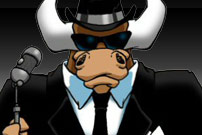
Sheryl Crow
Celebrities Home / Entertainment Home
ALSO: Don't miss Red Rocker's interview with Sheryl Crow!
It’s been a few years since Sheryl Crow burst onto the nation’s airwaves with the massive 1993 crossover hit, “All I Wanna Do” and the somewhat less massive “Leaving Las Vegas,” but she’s proven to be anything but a 1½ hit wonder. Remaining significantly photogenic and meriting gossipy attention well into her 40s, the multi-Grammy-winning singer-songwriter remains a respected musician and one of the best-known names in the more adult end of the modern musical spectrum.
Born in Missouri in 1962, Sheryl grew up in a musical household. Her mother was a singer and piano teacher, and her father played trumpet while doubling as a lawyer. A classic high school overachiever who went out for cheerleading and the Future Farmers of America, the hardworking young Sheryl attended the University of Missouri, where she studied music and education. Out of college, she went to work in St. Louis as a music teacher for autistic children by day, while playing in area bands at night. A meeting with a local music producer eventually led to a number of lucrative jobs recording musical jingles. Within a few years, she had moved to Los Angeles and had gotten a gig as a featured back-up singer on Michael Jackson’s “Bad” tour.
Though her initial attempts at landing a major label went badly, she continued as a highly successful back-up singer for a diverse group of mainstream superstars ranging from Don Henley to Sting and Stevie Wonder. In addition, she was able to have songs recorded by Wynona Judd, Eric Clapton, and Canada’s own Celine Dion. It wasn’t long before she finally nailed that elusive recording contract. However, her first attempt at a record was made under the supervision of Hugh Padham, best known for his ultra-slick work with Phil Collins; the record was apparently to no one’s liking and was permanently shelved.
This setback reportedly led to a fairly lengthy period of depression – but Sheryl is said to have snapped out of her musical funk with the help of an informal collective of musicians dubbed the Tuesday Night Music Club, which included then-boyfriend, Kevin Gilbert. As the name implied, the club was very much a group project, but with excitement building about the quality of the work and with Sheryl the only member with a recording contract, the album, The Tuesday Night Music Club, would be released under her name.
The album was not quite an instant worldwide smash, but that changed with the release of the third single, “All I Wanna Do,” a catchy celebration of L.A. party life partially drawn, oddly enough, from the writing of Utah poet Wynn Cooper. The record sold millions of copies, but the success took an ugly turn with public disagreements over the amount of Sheryl’s contribution to various songs, and a public misunderstanding with tragic overtones over the inspiration for the song, “Leaving Las Vegas.” (Writer John O’Brien was a friend of a Tuesday Night Music Club member David Baerwald, who borrowed the title of the new novel for the song. O’Brien publicly complained at remarks that Sheryl made on “Late Night with David Letterman” which were interpreted as implying the song was autobiographical. Sadly, O’Brien committed suicide for unrelated reasons shortly after the dispute, months before the release of the Oscar-winning film based on his novel. Kevin Gilbert also died unexpectedly a few years later.)
Putting her massively successful but emotionally wrenching first record behind her, Sheryl opted to produce her new, self-titled solo record herself, but she nevertheless made the very savvy decision of hiring the team of Mitchell Froom and Tchad Blade to assist her in the studio. The innovative pair had worked with an assortment of respected artists ranging from art-folk legend Richard Thompson to Suzanne Vega, Elvis Costello, and Los Lobos. The pair brought a flair for unusual sounds, helping Sheryl to prove she was a creative hit-maker in her own right. Sheryl Crow was another smash hit, and included such inescapable songs as “If It Makes You Happy” and the eventual Subaru commercial jingle, “Everyday is a Winding Road.” That album and, to an even greater extent, its follow-up, The Globe Sessions, netted Sheryl increased respect from music critics and fellow musicians.
Since then, Sheryl’s career has been less dramatic, but hardly low profile. She released a third Grammy wining album and acted in 1999’s “The Minus Man” with then-boyfriend Owen Wilson. She has also experimented with other musical genres, performing Burt Bacharach and Hal David’s “One Less Bell to Answer” and a controversial version of Cole Porter’s “Begin the Beguine” in the film “De-Lovely.” She’s also continued her lifelong habit of collaboration and her work has been heard on innumerable film soundtracks.
She’s also been in the news for political activism and has worked closely with environmental activist Laurie David. A public argument over global warning with Bush administration political advisor Karl Rove, and a suggestion on her website asking fans to reduce their consumption of toilet paper for the sake of the environment, caused Sheryl to take some public ribbing. On a more serious note, she has also publicly discussed her opposition to the war in Iraq, as well as her bouts with depression, had minimally invasive surgery for breast cancer (she’s doing fine), and endured the break-up of her relationship with champion cyclist Lance Armstrong.
Still, the big news in February of 2008 was the release of her new, politically charged folk-pop album, Detours. Marking her reunion with her formerly estranged “Tuesday Night Music Club” producer Bill Bottrell, the record was a clear sign that Sheryl was very much a lifer in the singer-songwriter game.
 Tired of striking out? Check out these Dating Tips for all sorts of advice on how to finally get the girl! Also, we tell you all about some of the best online dating sites and how you can use them to hook up with more women!
Tired of striking out? Check out these Dating Tips for all sorts of advice on how to finally get the girl! Also, we tell you all about some of the best online dating sites and how you can use them to hook up with more women!
Sheryl Crow on the Web
SherylCrow.com
Sheryl’s new official website greets visitors with clips of new songs as well as news, tour information, a blog featuring her latest videos, and much more.
Wikipedia
A rundown of Sheryl’s life and work.
IMDb
An online database of listing all of Sheryl’s many film and television music credits, and some biographical information to boot.
Sheryl on Instagram
Sheryl’s latest pics and video clips.
On the Screen and Radio
Except for her part as a serial killer’s victim in Hampton Fancher’s offbeat thriller, “The Minus Man,” her performance of a Cole Porter standard in “De-Lovely,” as well as a tiny part on an episode of – wait for it – “Cop Rock,” Sheryl herself has been mostly off-screen when it comes to film and dramatic television. Her music, however, is another story. By our count, her songs have been featured in some 27 films and numerous television shows, ranging from “Cold Case,” “The Sopranos” and “The Wire,” to “One Tree Hill” and, for you classicists, “Melrose Place.”
Sheryl Crow Says
On roads taken and not taken:
“There ain't nothing like regret to remind you you're alive.”
On age and body parts:
“I look at my hands and go, 'Hmm... what happened? Whose hands are those? Oh my God, they're mine'”
On conflict resolution:
“I think war is never the answer to solving any problems. The best way to solve problems is to not have enemies.”
On maturing as a musician:
“Now that I'm in my forties, it's much easier to be an artist. It's good knowing that I'm not in the game to be competing with really young groups of kids on the radio. Or to, you know, make 'beat' music.”
You can follow us on Twitter and Facebook for content updates. Also, sign up for our email list for weekly updates and check us out on Google+ as well.




